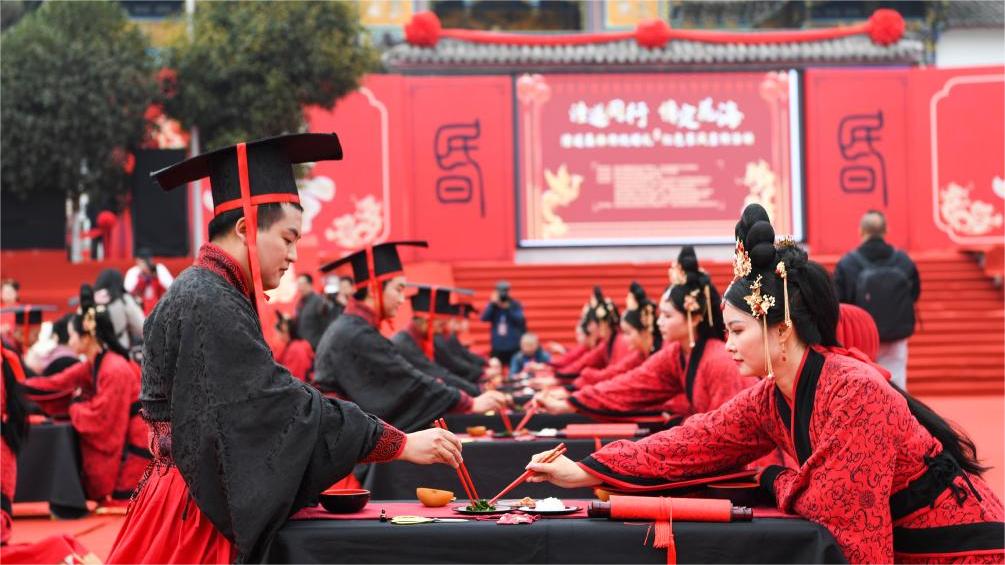Beitun's cold-water fish dishes tantalize taste buds in NW China's Xinjiang
Boasting abundant water resources, the city of Beitun in northwest China's Xinjiang Uygur Autonomous Region has become renowned for its cold-water fish dishes, which tantalize people's taste buds.
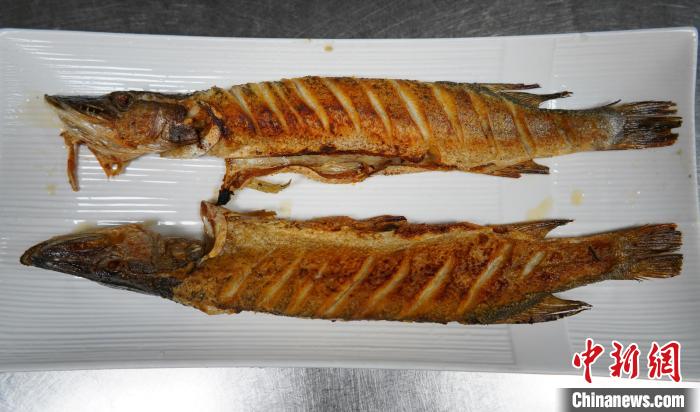
Photo shows fried pike. (Photo/Yin Jianglin)
"Fish species that inhabit the natural cold waters grow slowly, which allows them to accumulate rich amounts of nutrients, including fatty acids and amino acids. The flesh of these fish is characterized by densely packed muscle fibers, resulting in an exquisitely delicate texture," said an official from the Agriculture and Rural Affairs Bureau of Beitun. Among the dozens of cold-water fish species found here, the northern pike, bream, Siberian dace, silver Prussian carp, ide, and zander are particularly popular with consumers.
"The diverse range of cold-water fish species, each with its own distinctive and rich flavor, not only provides locals and visitors with a tantalizing array of culinary choices, but also helps promote the local culinary culture," added the official.

Photo shows a vast lake where cold-water fish inhabit thrive in Beitun city in northwest China's Xinjiang Uygur Autonomous Region. (Photo/Li Zhenghu)
A prime example of Beitun's cold-fish cuisine is the renowned Waibozi Fish Restaurant. "I opened a small restaurant here in 2000, mainly serving local fish," said Que Fujiang, the 57-year-old restaurant owner. "Back then, Beitun was a small town, but there was already a vibrant scene of small restaurants specializing in fish dishes."
As the city developed rapidly, Que's restaurant expanded from just over 30 square meters to over 300 square meters. Que makes it a point to visit the market early every morning to select fresh fish for the day, understanding that the freshness of the fish is crucial to the taste of the dishes.
Together with local chefs, he has explored specific methods tailored to different fish species. They have refined and applied dozens of cooking styles, such as steaming, frying, pan-frying, and boiling, to over 20 different types of fish, including crucian carp and common carp.
"Many locals come here to taste the most authentic flavors," he noted. Additionally, his wife, Yang Fengying, adapted a dish of crucian with Chinese chives from her hometown in Sichuan Province, southwest China, to better suit the tastes of local consumers.
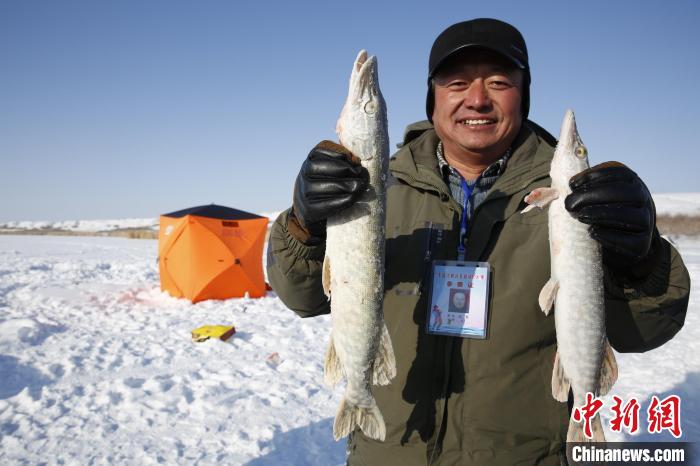
A man holds cold-water fish in his hands in Beitun city in northwest China's Xinjiang Uygur Autonomous Region. (Photo/Zhang Wencheng)
An out-of-town customer commented, "10 different fish species are prepared into 10 distinct flavors, satisfying my taste buds while letting me learn about the local culture. This trip was truly worthwhile." Que regards this as the highest form of praise.
"This is my first time sampling the cold-water fish feast here, and it's truly an eye-opener. As a native of Guangdong Province in southern China, I mostly consume saltwater fish. I used to think freshwater fish might lack freshness and have an earthy taste. But in Beitun, I find the freshness and delicate texture of the fish comparable to saltwater varieties," remarked Feng Li, a tourist from the coastal province of Guangdong.
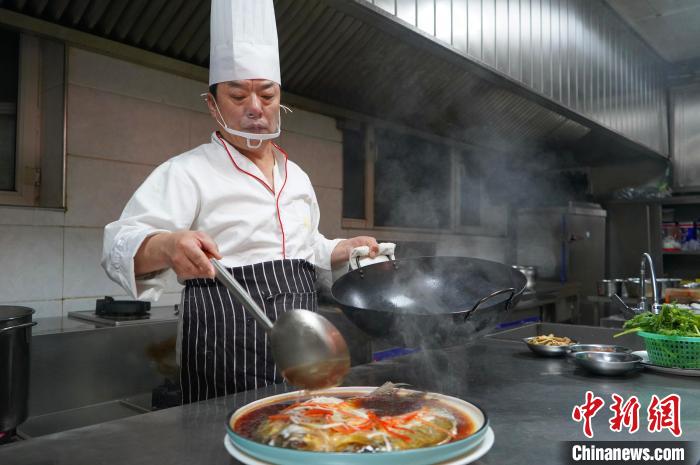
Que Fujiang cooks cold-water fish. (Photo/Li Mengna)
The variety of fish restaurants has spurred the local tourism industry. Despite the intense cold these days, the night markets remain lively. Diners wearing down jackets and gloves while enjoying barbecue have become a unique scene.
A local industry insider, surnamed Cheng, stated that the key reason behind the popularity of the cold-water fish feast in Beitun and the surrounding counties lies in its fresh, delicious taste. However, he noted that the freshness might be somewhat compromised after thawing and transportation. "If you want to experience fresh and authentic cold-water fish feast, it's best to come here, to the place of origin," he advised.
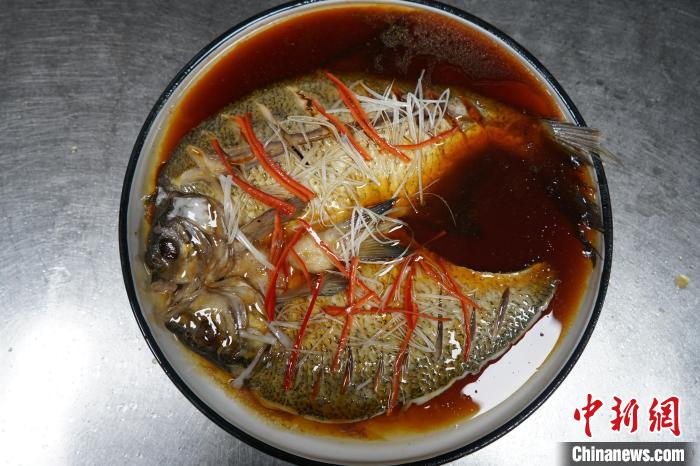
Photo shows steamed flatfish. (Photo/Li Mengna)
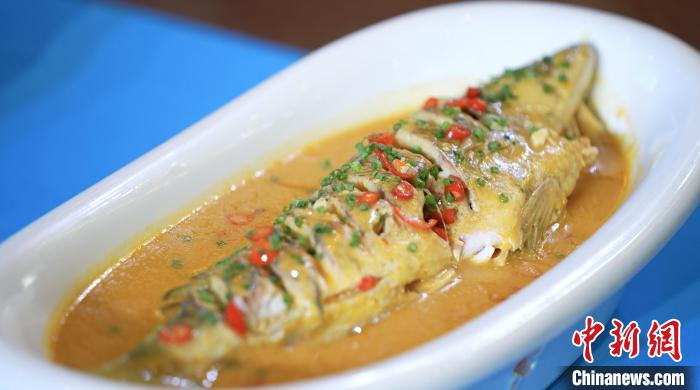
Photo shows cooked zander. (Photo/Yin Jianglin)
Photos
Related Stories
- The flavors of China: Paomatan Tuotuo Fish in Sichuan
- Food vlogger in China's Suzhou shows how to make novel, difficult dishes
- China sees craze for ready-to-cook dishes
- British cook and food-writer introduces Sichuan food through her new book
- 'Thin blue mushroom' dish offered at Hunan University
- Lishui citizens consume billions of cicadas in one summer
Copyright © 2024 People's Daily Online. All Rights Reserved.









